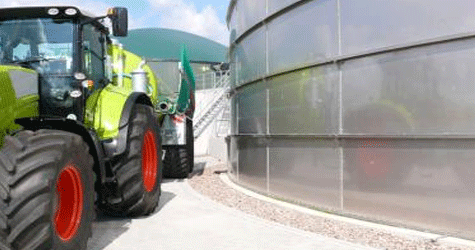A milk powder producer from Uruguay has engaged WELTEC BIOPOWER for the construction of a 3-MW biogas plant.
The building work at the site north of Montevideo will begin in January 2013. In the first development stage, WELTEC will set up an 800-kWel plant. The full output of 3 MW is to be installed by 2015.
Due to factors such as the high requirement profile and the needed quality standards for the production of the milk dry matter, the contract was awarded to WELTEC BIOPOWER. The customer has commissioned the setup of two stainless-steel fermenters with a capacity of 5,000 m3 each. Moreover, WELTEC provides the client with a high degree of international experience and flexibility in scaling plants, also in the industrial range. Of course, WELTEC also attracted the Latin American investor‘s attention with large biomethane parks it constructed, such as the one in Könnern, Saxony-Anhalt, Germany.
The entrepreneur, who produces its milk products for the Asian market, will also run the biogas plant. He will be able to use the electricity as well as the accumulated exhaust heat in his manufacturing and packaging processes. With his 8,000-odd dairy cows and the feed production, he covers significant parts of the entire value chain. As the establishment of the subsequent development stages of the biogas plant is to be accompanied by an increase in the number of dairy cows to approximately 14,000, there will be enough cow manure as substrate for the plant.
All in all, the agricultural industry in Uruguay has a huge potential in the field of raw material for the production of bioenergy. What is more, it plays a key role in the national economy, contributing almost 10 percent to the gross domestic product of the country with its population of 3.5 million. Currently, Uruguay‘s primary energy needs are still being covered by crude oil. However, at least half of the energy consumption is to be covered by renewable sources by 2015. For this reason, the government in Montevideo has formulated the goal of using at least one third of the agricultural waste for the generation of energy.
The legal framework conditions for this goal were established in 2010: Until 2030, a feed-in tariff is to ensure a plant population with a capacity of 200 MW. Since mid-2010, the operators have been able to feed in the green power into the grid of the state energy provider UTE or sell it directly to UTE.
Due to the growing need for energy, the climate goals, and the desired independence from energy imports, Uruguay‘s energy policy focuses on a broad energy mix and the involvement of domestic energy resources. The implementation of these strategies in conjunction with the investment-friendly environment offers experienced enterprises like WELTEC BIOPOWER favourable operating conditions. The project could serve as a reference example for the country as well as the continent as a whole.









